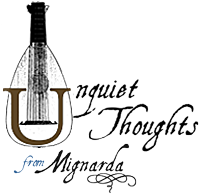Saturday morning quotes 8.46: Evolution?

Living as we do in our cynical age where all the angles have been discovered and exploited, individuals seeking to understand the elemental worth of the human race invariably look to the past in search of a sense of cultural heritage that perhaps justifies the unpleasantness of the present. Peering through an objective lens, what we see when viewing the past is not an innovative and insistent propulsion toward the future, but rather the collected accomplishments of individuals who wished to dwell in—and perhaps improve upon—their present.
Problems arise for the researcher emerging from an exhaustive examination of historical culture only to find that today’s present simply lacks quality and substance. I’m reminded of the unfortunate food available on a long cross-country train trip, and the dismay and disgust outwardly exhibited by a group of French tourists when they approached the Amtrak snack bar. “Is this all there is?” It is sometimes difficult to accept an insubstantial present when one has been spoiled by the richness of the past. Nevertheless, we crack on.
Having just released Donna Stewart’s second album of solo Gregorian chant, we follow up with a bit more background on how plainchant is the very basis of all early music, and how it figures into the sort of instrumental music many of us know and love, but few understand.
Historians accept that we know very little about medieval instrumental music, other than the scribblings left behind in a few manuscripts from the 15th century. There survives a wealth of pictorial evidence in paintings, woodcuts and sketches that show how music was shared, mostly in domestic surroundings. But what music did they play? Apart from dance tunes, such as those anthologized in Medieval Instrumental Dances by Timothy J. McGee (Indiana University Press, 1992), it is apparent that nearly all other music that circulated was derived from sacred polyphony or popular chansons of the day, which we shall see were one and the same.
“Very slow, augmented cantus firmi against ever more rapid and formulaic passagework seem to denote an increasing virtuosic pride of the performers. Organists would have practiced this as well, of course: the monorhythmic style of plainsong settings could have been used by instrumentalists as a training ground for improvisation. Paumann’s fundamenta, and those of his apprentices, paved the way for codification and consolidation of improvisatory practices over cantus firmi with predictable rhythm…Equally predictable, at least for a good German wind or string player, were the cantus and tenor lines of the six or seven most famous chansons of his age. He knew them all by heart, of course. The practice of literal quotation of the borrowed voice (even in augmented values) suits him perfectly: when performing with new colleagues, he might well ask them to be allowed to prove himself with new figurations against a universally known tune which they can play to him.”
– Reinhard Strohm, The Rise of European Music, 1380-1500, Cambridge University Press, Cambridge, 1993, p. 536.
The Paumann mentioned above of course was the German organist and lutenist Conrad Paumann, credited with having first devised the system of tablature to create a score of polyphonic music from separate partbooks to display on a single staff, a system of notation used by historical keyboardists and lutenists. The cantus firmi mentioned by Strohm were frequently plainsong melodies that were adapted to secular chansons, as detailed by David J. Rothenberg in The Flower of Paradise: Marian Devotion and Secular Song in Medieval and Renaissance Music. As Rothenberg points out, we now understand that many seemingly secular chansons were actually Marian devotional songs in disguise, a fact reinforced by the use of sacred cantus firmi as the core of the composition that was contrapuntally complex and frequently canonic.
Compare the richness of this historical past with the flavorless aesthetic poverty of the present day, and please explain to us how irritatingly ubiquitous disposable electronic devices enrich the mind and feed the soul. Or just listen to Donna’s new album instead.
